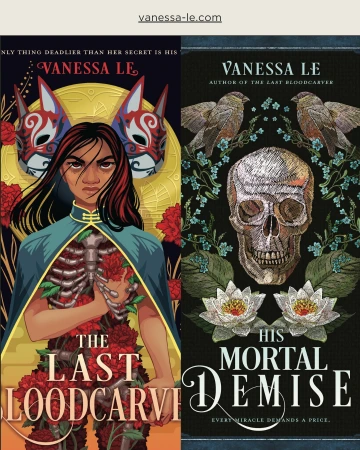Where Science Meets Fantasy: A Conversation with Vanessa Le
by Lucy Xi Lin and Vanessa Le • compiled by Shi Li • Jul 24, 2025 • 2-min read

In a way, science is its own magic system. Its applications can seem unbelievable–until you take the time to learn its rules.
Background
Vanessa Le is a Vietnamese American author from the Pacific Northwest. She holds a degree in Health and Human Biology from Brown University. Le is the author of The Last Bloodcarver and its sequel, His Mortal Demise. Her work has received starred reviews from Kirkus Reviews, School Library Journal, Publishers Weekly, and Booklist. Le's stories blend imaginative science fantasy with richly developed characters and thought-provoking themes. When not writing, she enjoys gaming and immersing herself in imaginative worlds.
Xi Lin (XL): In your books, you explore themes like resurrection and morality. How do you balance the fantastical elements with the emotional weight of these themes?
Vanessa Le (VL): The Last Bloodcarver and His Mortal Demise explore what life and death mean–and how far someone might go to defy these terms. Death seems like a concrete term, but its definition has actually changed over time. Are you dead when your heart stops beating? In the past, that might’ve been true–now, we might call that cardiac arrest and bring out the defibrillator. Are you dead when your brain ceases functional activity? Today, sure–but what about in the future? Or, what if I introduced a magic system that defied the capabilities of modern medicine?
I enjoyed exploring those kinds of questions and themes in my writing, but never at the cost of entertainment. I always endeavor to write, first and foremost, a story that is enjoyable to read. That’s why I personally love genre fiction. However, I don’t think that this means that heavy themes such as resurrection and morality are misfits in genre fiction. In fact, I think fantastical elements aid the exploration of such themes. Cornerstones of the fantasy genre, such as magic systems and worldbuilding, actually act as the perfect canvases for such metaphors. As long as I have something to say, I’ll keep saying it through fantasy.
XL: As an author with a background in Health and Human Biology, how do you incorporate your knowledge of science into your fantasy writing, especially in your depictions of bloodcarving and heartsooths?
VL: I grew up thinking that science and art were opposites, but they’re truly complementary. Once I found the little niche that was science fantasy, I never looked back. One thing about me is that I love unique magic systems–and in a way, science is its own magic system. Its applications can seem unbelievable–until you take the time to learn its rules.
That’s where bloodcarving came from. I wanted to write a form of medicine that followed all the rules of the physiology and anatomy that I’d learned about in class–yet still held wonderment. In most ways, it doesn’t defy the laws of nature any more than modern medicine does, but there remains that rim of phenomena that exists with every scientific territory. I like to believe it’s simply because the characters haven’t discovered all the rules yet.
XL: How does Asian culture and your Vietnamese heritage influence your creative writing?
VL: In my childhood, I read books featuring characters that predominantly didn’t look or act like me, and I enjoyed them well enough. But as I grew up, and Asian media entered the mainstream and became more accessible, I realized there’s an aspect of shared upbringing that is unique to every culture. Being able to deeply empathize with the cultural struggle of a fictional character would immediately elevate a piece of media for me.
It changed my writing, too. I used to write about more grand, ‘epic’ themes–saving the world, defeating evil. Now, ironically, I write about smaller conflicts–the relationship between a girl and her culture, or a boy and his family. I find these themes are a lot more specific and impactful to me, and that’s what I endeavor to achieve in my writing–intimacy, vulnerability, and honesty.

